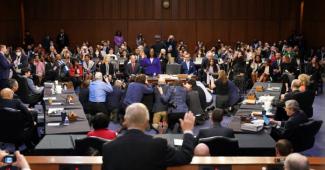
Even though I had planned to finish listening to the excellent audiobook recording of Michelle Zauner’s memoir, Crying in H Mart (read BY the author herself!), I’ve instead been watching and listening to the “Advise and Consent” Hearings in the process to confirm Judge Ketanji Brown Jackson to the US Supreme Court. While I admire Judge Jackson’s monk-like poise and restraint, I find the hearing generally to be a farcical waste of time at best, and a platform for lob-and-retreat disinformation at worst. Here is my bulleted rant, which, short of getting things off my chest, will likely serve no one.
-
The committee senators ask questions that are outside the purview of the nominee, or are outside the relevance of the job for which the nominee is being interviewed.
-
The senators use their “advice and consent” time to grandstand, make clear their biases and preferences, and crack quips that they hope will make headlines and drum up excitement for re-election or even a presidential bid.
-
The senators don’t listen or even seem to pay attention to the nominee’s answers, and often aren’t there when it’s not their turn to ask.
-
The senators interrupt the nominee -- supposedly to prevent the nominee from taking up too much of the senator's allotted time for questioning, but really it’s just to keep their train of awfulness from getting derailed.
-
Supportive senators use their time to flatter the nominee, repeat facts about their vitae for over-redundancy, or glorify the nominee’s life outside of the role for which she is being interviewed. Imagine if you went to an interview where the interviewer spent a good chunk of the time talking about how great your brother and uncles are. Wouldn’t you worry a bit that they’re not taking your skills and experience seriously?
-
Supportive senators talk more to the points of other senators (in rebuttal) more than to the nominee -- because the nominee cannot say what they may want to say.
-
It’s sooooo obvious that the nominees, if not politically biased themselves, are seen by the senators and the public as having a political affiliation, even though impartiality is the hallmark of the job. This creates a friend/enemy approach to this process and destroys what I imagine the original purpose of this time was -- to honestly vett the nominee for the job at hand.
-
But what about the Kavanaugh and Coney-Barrett hearings? Didn’t the hearings bring to light worrisome facts about these candidates? They sure did. But did that spotlight do anything to prevent the candidates being confirmed by the political majority? Nope. Then, if it’s such an open-and-shut case to move a majority-approved nominee through to confirmation, why go through all of this rigamarole? Exactly.
-
The nominee, at least after Bork’s sh*tshow (nasty as he was, I commend his willingness to speak freely), is coached on both how to answer questions, and also how to evade questions. It’s all a dance. A long, boring, potentially damaging and ultimately divisive dance.
-
So the senators don’t or can’t ask meaningful questions, and the nominee can’t say anything meaningful or substantive, so why put any of them through these exhausting days?
Also:
-
When will these Republican politicians and pundits learn more about what CRT actually is? When will they see that to be Anti-Racist does not mean being Anti-White? It galls me that they display their racism (owned or misinformed) so brazenly and see CRT as a threat to their well-being. If treating people equally and righting historical wrongs that are embedded deep in our social order is a threat to your well-being, you must understand to some degree how their current oppression benefits your well-being. Like, WTF?
-
If cameras and televised proceedings are to blame for some or most of this behavior, then I shudder to think how it may affect having “Cameras in the Courtroom.” Or, I could hope that “better” politicians (please, on both sides) use the opportunity to educate the public on important issues and provide transparency for how our government works (the government would have to actually work, of course). If they could model human decency, professional acumen, and compassionate communication, I’d be all for it. If they’re just going to argue with one another about senseless misunderstandings or spread disinformation and fear, they can skip it -- there’s more than enough of all that in the media already.
So, I hate to complain about something and not offer a solution, but short of continuing to be an informed voter and maybe sharing my thoughts with an open hand, I'm not sure what else I can do. Leave a comment if you've got an idea to make the world a little better -- anytime, really.
From a speech nerd to a debate champ, Go, KBJ, go!
Some articles I found informative, because, as you can probably guess, I'm no expert on this:
https://ballsandstrikes.org/nominations/supreme-court-confirmation-hearings-brief-guide/
https://www.scotusblog.com/2018/08/putting-supreme-court-confirmation-hearings-in-context/
Comments